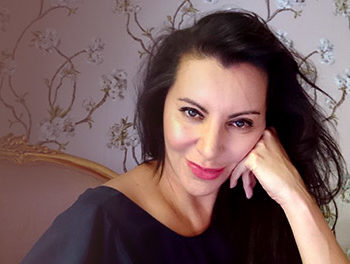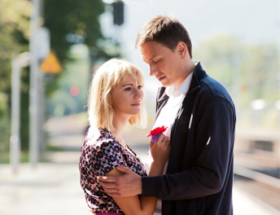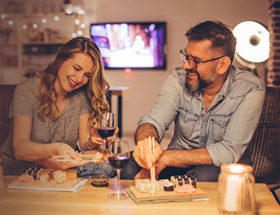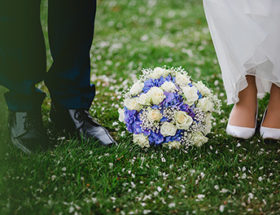Being in a relationship with a narcissist can be incredibly challenging - but it can also teach you valuable lessons. From seeing through superficial charm to discovering your own strength,…
Love is one of the great mysteries in life. Sometimes it makes all the sense in the world, and sometimes none at all. Wanting to get to grips with the nitty and gritty of what’s actually happening in your head, and heart, EliteSingles sat down to analyze the psychology of love with expert psychotherapist, Louisa Niehaus…
Carl Jung said, “Your vision will become clear only if you look into your heart. Who looks outside dreams, who looks inside awakens”. Looking inward provides an opportunity to understand our relationships on a deeper level, while not being in touch with your internal fears, desires, and often unconscious emotions can lead to a disconnection between what you want and what you actually have in life and in love. Using a Jungian angle, Louisa breaks down what you want to know about the psychology of love. She explains that tuning into the love you crave and understanding who you are drawn to can uncover your ‘currency of love’…
Some facts about love: behind the psychology of love
Looking at the psychology of love through an analytical lens provides a glimpse under the surface of relationship patterns. Examining what is actually going on in the subconscious provides the unique opportunity to understand questions like, ‘why do we fall in love with someone?’ or ‘do we choose who we fall in love with?’
Working with Jungian psychology to apply analytical concepts, such as archetypes and dreams, can unlock access to unconscious desires, your barriers to love, and the key complexes at play in your relationships. Louisa walks us through some of these big questions about love and the psychology behind it.
As a starting point, when it comes to love, people often don’t have a clear understanding of the love they want to create in their lives. What would you say the first step is to identifying the love you need? In other words, how can you start understanding your personal psychology of love?
LN: The good news is that there is a process to understanding the love you need and the love you have. Through in-depth analysis one can elicit subconscious answers – these can be accessed both in a therapy setting or exploring these questions in different ways, like a course, to gain the tools.
In the Western world, we have been conditioned to believe that only the empirical, rational and logical mind is relevant. However, love is anything but rational. The giddiness, spontaneity and irrationality is so seductive that we never want the ‘honeymoon phase’ to end!
So how to identify what you need in your love relationships? It’s usually the very thing that you find the most elusive. Or it’s the quality that you yearn to find in the other, and then often been disappointed or heartbroken when they have been unable to fulfill your needs. This need stems from an innate, unconscious yearning for a sense of completion; if it is fulfilled then your psyche believes that you will be complete. We continue butting our heads looking for this unrequited love until we find someone with a resonance that can respond to the needs of this unrequited love.
Having experience as a psychotherapist and running courses on awakening your love, what are the stumbling blocks or barriers that can prevent people from enjoying a happy and healthy relationship in their life?
LN: In my experience, people are generally unaware as to what their key motivators and drivers are. Often, it’s difficult for people to clearly articulate why they find someone attractive. There are the obvious factors such as looks, status, a perceived mutuality, chemistry. However, it’s surprising to discover that it’s the unseen, unconscious factors that cause the stumbling blocks. It’s very difficult to truly face the uncomfortable sides of our personality, that we may be short-tempered, defensive, self-righteous, needy or clingy.
However, most of us have an inclination as to when we’re ‘acting out’ in relationships. The older we become and the more experience we have in relationships, often the more we are able to experience ourselves through the other. Significant relationships serve as mirrors. I advise to reflect on significant relationships and look to see if there are recurrent themes. Are you choosing similar partners, people with similar personality traits? Sometimes these themes are not initially evident but if one looks carefully, generally there is a link between the mental or emotional space you’re in when seeking out a relationship and the type of partner you attract.
The danger being, people who are very needy and looking for someone to match that tend to attract an equally needy partner. This often ends up in a co-dependent situation, which becomes unhealthy for both individuals. In unhealthy relationships, both partners feed off their mutual need to be needed. Often the true needs of the relationship are obfuscated, neglected because the relationship is characterized by intense highs and lows, punctuated by feeding the insatiable and unrealistic needs of the other.
This question is poignant, for, without introspection and self-awareness, we look to the other to complete and fulfill us. When, in fact, we need to nourish ourselves to be as complete as possible, so that the alchemical addition of the magical other serves to further embellish us, but not complete us. If we look for the other to complete us, we remain unrequited and generally unfulfilled. And I have found this to be one of the most common stumbling blocks in relationships.
What do you believe the reason is that we fall in love with one person, and not another? Are there certain key complexes at play or what determines who we fall in love with?
LN: This may come as a surprise but we fall in love with another because they embody parts of us, seen and unseen, known and unknown to us. There are aspects of our femininity and masculinity that come alive and dance in one another, when we experience alchemical love. In essence what you are seeing in the other, when you fall in love, is yourself.
There are unconscious drives and beliefs that affect our decisions and actions in relationships. Analyzing these drives allows you to become aware of how your complexes attract complexes in others. For example, if you’re a masochist, you’ll look for a sadist. This type of attraction will make you feel whole with the other since you both carry complexes that are in synergy, even if not good for you. This is why when relationships end you feel like a part of you has been ripped away – that you’re not whole anymore!
What is ‘currency of love’ – please can you explain that concept?
LN: Love currency is the vernacular, or unique language, which is used in our primary love relationship to buy, barter, engage, trade and play. For example, my currency is communication – I adore communication, talking, sharing, understanding, being understood. My biggest gift to another, in my mind, is to be direct and clear and so I enjoy receiving this currency in return. But my currency of communication has also served a purpose in that it circumvents the need for game playing in the early stages of relationships. However, if this is not a correct fit for the other, one’s currency could serve to alarm a partner. For example, although it’s a primary driver for me, the level of clarity and communication may be overwhelming for someone else. I now know that initially I may have to temper this in the early stages of a relationship, but it will never remain forever hidden, as the deeper I am in a relationship, it will emerge as my primary currency.
Others may have a currency that equates to acts of service or help. For example, they may want to help you with tasks, fixing things, walking the dog etc. With currencies of love, do not be surprised if they’re also evident in the physical aspects of a relationship. When you identify your currency of love, it’s so deeply entrenched that you will find aspects of your love currency in your intimate physical relationship also. In many ways, it’s similar to your language of love.
What do people need to know and understand about their own currency of love? How is it possible to find and identify it?
A love currency is a very strong commodity. It is your equivalent of the Dollar. It can also be equated to your personal signature. It’s so intrinsic to you, that to accurately define it might actually be a challenge. I often work in this area with clients. Some cues are how you say and do things, what significant acts you do for others that make you feel happy and fulfilled. These acts are often very evident at the beginning of a relationship when you want to be seen at your best. One tends to offer up the best of yourself and these are seen in light of your unique currency.
It’s not always possible to define it in its entirety. It’s those characteristics of yours that pop out unsolicited when you’re in the throes of a new relationship. You may find yourself wanting to do little acts of love and service, like baking or fixing things.
Or it could be expressing your feelings and intentions clearly – expressing your admiration, pride or joy in the other.
Your love currency makes you unique and will draw another in because of the exact way you engage with them. Your currency will give you the ability to navigate your way into the world of the other – if they recognize and enjoy your currency. For example, someone who does not enjoy being helped or to have assistance with small tasks will not find resonance with a person who does.
However, at the risk of being a contrarian, I would caution people not to become too fixated on trying to accurately define their currency. Rather, have an awareness of it and allow it to retain a magical quality that gets lit up when you meet a magical other! We sometimes get too caught up in trying to self-analyze and evaluate ourselves in order to be perfect beings and attract a perfect other.
What do you wish people could understand about the psychology of love?
LN: I dearly wish that people would allow themselves to indulge more in love. The more experience we have of life and love, often the more guarded we become. Learn to thoroughly acknowledge and understand yourself and your past relationships, to free yourself to be able to love.
Love is beautiful. We are uniquely beautiful beings! We become jaded about love, using phrases such as;
“It’s so difficult to find love”
“There are so few good men/women out there”
“People have so much baggage”
Once we have been through a number of relationships or have reached a certain age, we can become burdened with what’s commonly known as ‘baggage’. If you have travelled, you’re familiar with the fact that real suitcases are a lot more lightweight these days! I strongly believe that with an increased awareness of self, that our own baggage will be more lightweight. That in turn, we will be able to better able to navigate the minefield that we perceive the dating world to be.
What advice would you give someone looking for a partner and a fulfilling relationship?
LN: Take the time and effort to know yourself! First, discover your own beauty, what makes you happy, fulfilled and joyful. Don’t expect someone to magically fill this in you. Paradoxically no one will know what fills you better than you do. This is the classic mistake, we look for the other to fill a void, when in reality, your contentment and inner fulfillment will be further complemented by someone who electrifies and enhances these qualities in you. These intrinsic qualities in you need to be entrenched and solid, so that even when there are difficulties or hurdles in your relationship, that you always know there is a core within you that is resolute and intact.
Discover your shadow, your unconscious, have an awareness as to what you bring to a relationship. Learn from your previous relationships. It takes two to tango. It’s very easy to exonerate yourself entirely from your role in your previous relationships. Have the courage to own those parts of yourself that aren’t particularly pleasant. If you have the bravery to do so, the next time these parts pop out unbidden in your relationship, you will be less likely to be blind to them and more likely to adapt your behavior. This gives you the awareness to work with the shadow parts of yourself, to navigate a better outcome versus a familiar and uncomfortable scenario. Many of my clients in private practice and in my courses are aware of what I call ‘familiar arguments’. The familiarity of these arguments can stem from the inception of your own relationship history, irrespective of which partner! So shine the light on these patterns and you will have the freedom to change them!
About Louisa Niehaus:
Louisa Niehaus is a psychotherapist, consulting in South Africa and internationally to a broad base of clients, focusing on relationships, personal growth, trauma, conflict management and self-actualization. She has a specialization in trauma therapy, and a particular interest in the psychology of love, midlife transition and awakening. Unconscious motivators for behavior, drives and relationships inspired Louisa to establish The Black Door Foundation, an academy for adult actualization, specializing in relationship insights and intrinsic growth using the principles of depth psychology. Find out more about her work and courses here.
Sources:
Exclusive EliteSingles interview conducted with Louisa Niehaus, February 2018



